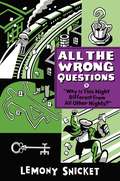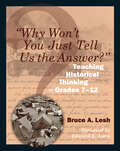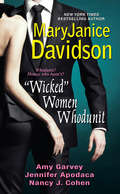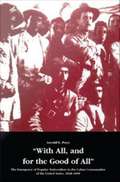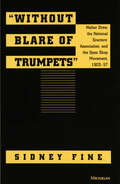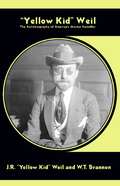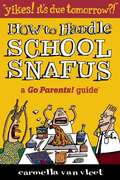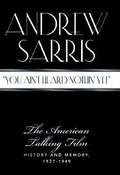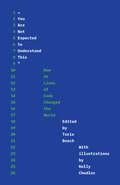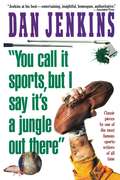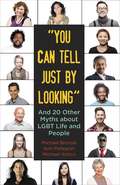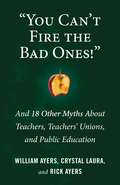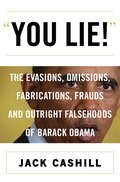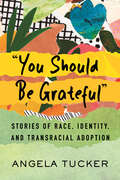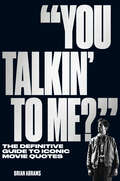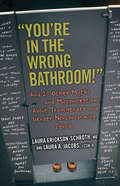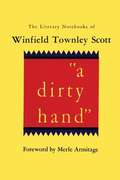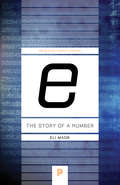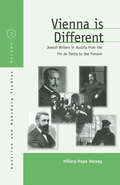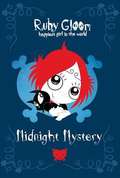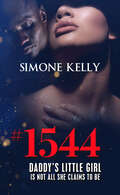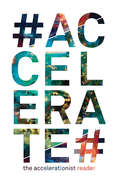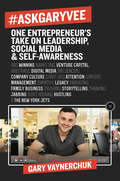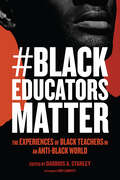- Table View
- List View
"Why Is This Night Different from All Other Nights?" (All the Wrong Questions #4)
by Lemony Snicket SethTrain travel! Murder! Librarians! A Series Finale! On all other nights, the train departs from Stain'd Station and travels to the city without stopping. But not tonight. You might ask, why is this night different from all other nights? But that's the wrong question. Instead ask, where is this all heading? And what happens at the end of the line? The final book in Lemony Snicket's bestselling series, All The Wrong Questions.
"Why Won't You Just Tell Us the Answer?": Teaching Historical Thinking in Grades 7-12
by Bruce LeshEvery major measure of students' historical understanding since 1917 has demonstrated that students do not retain, understand, or enjoy their school experiences with history. Bruce Lesh believes that this is due to the way we teach historylecture and memorization. Over the last fifteen years, Bruce has refined a method of teaching history that mirrors the process used by historians, where students are taught to ask questions of evidence and develop historical explanations. And now in his new book 'Why Won't You Just Tell Us the Answer? he shows teachers how to successfully implement his methods in the classroom. Students may think they want to be given the answer. Yet, when they are actively engaged in investigating the pastthe way professional historians dothey find that history class is not about the boring memorization of names, dates, and facts. Instead, it's challenging fun. Historical study that centers on a question, where students gather a variety of historical sources and then develop and defend their answers to that question, allows students to become actual historians immersed in an interpretive study of the past. Each chapter focuses on a key concept in understanding history and then offers a sample unit on how the concept can be taught. Readers will learn about the following:, Exploring Text, Subtext, and Context: President Theodore Roosevelt and the Panama Canal, Chronological Thinking and Causality: The Rail Strike of 1877, Multiple Perspectives: The Bonus March of 1932, Continuity and Change Over Time: Custer's Last Stand, Historical Significance: The Civil Rights Movement, Historical Empathy: The Truman-MacArthur Debate By the end of the book, teachers will have learned how to teach history via a lens of interpretive questions and interrogative evidence that allows both student and teacher to develop evidence-based answers to history's greatest questions.
"Wicked" Women Whodunit
by Jennifer Apodaca Amy Garvey Nancy J. Cohen MaryJanice DavidsonLetters To My Readers - MaryJanice DavidsonSix people are missing from a mystery weekend, and aspiring mystery writer Caro Swenson is on the case with a hot-but-possibly homicidal hunk who seems to want to get his hands on Caro's. . .clues. Single White Dead Guy - Amy GarveyLanie Burke spent one insanely hot night with Mr. Drop-Dead Gorgeous. Now he's just dead on the steps of her cabin. What to do with the body? Hopefully, she can get some help from the cute guy with groceries tromping through the snow toward her. . . Fast Boys - Jennifer ApodacaHow did Tess Collins get caught up in a sleazy tabloid reporter's bid to get the dirt on NASCAR's pin-up boy, Ark Underwood? How did the jerk reporter end up dead on Underwood's hotel room floor? How is Tess going to save Ark's reputation? Or say no to his every desire? Three Men And A Body - Nancy J. CohenReality show contestant Heather Payne's assignment is simple: get a bed-and-breakfast in Winter Park up and running within seven days. But when "accidents" start plaguing the show, Heather begins to suspect the contestant she's sleeping with. . .
"With All, and for the Good of All": The Emergence of Popular Nationalism in the Cuban Communities of the United States, 1848-1898
by Gerald E. PoyoCuban-Americans are beginning to understand their long-standing roots and traditions in the United States that reach back over a century prior to 1959. This is the first book-length confirmation of those beginnings, and its places the Cuban hero and revolutionary thinker Jos Mart within the political and socioeconomic realities of the Cuban communities in the United States of that era. By clarifying Mart's relationship with those communities, Gerald E. Poyo provides a detailed portrait of the exile centers and their role in the growth and consolidation of nineteenth-century Cuban nationalism. Poyo differentiates between the development of nationalist sentiment among liberal elites and popular groups and reveals how these distinct strains influenced the thought and conduct of Mart and the successful Cuban revolution of the 1890s.
"Without Blare of Trumpets": Walter Drew, The National Erectors' Association, and the Open Shop Movement, 1903-1957
by Sidney Fine"Without Blare of Trumpets" provides a fresh look at the twentieth-century open shop movement. It reveals the central role played in that movement by the National Erectors' Association and by its commissioner, Walter Drew. Fine presents an absorbing account of the union-organized dynamiting campaign and illuminates the critical behind-the-scenes part played by Drew in one of the greatest labor trials in all of American history. This important book adds to our understanding of the building and construction industry employer resistance to unionism, the role of the government in industrial relations, and the impact of the New Deal labor-management relations. "Without Blare of Trumpets" makes a major contribution to the fields of labor history, business history, and industrial relations. It will be of interest to students and scholars in many areas of American history, and to all those interested in the welfare of American jobs and American workers. Sidney Fine is Andrew Dickson White Distinguished Professor of History at the University of Michigan, and the author of numerous books and articles.
"World-Class" Universities: Rankings and Reputation in Global Higher Education
by William C. Kirby Joycelyn W. EbyDiscussions of "world-class" universities have become an academic cottage industry in the 21st century, and definitions of the term are complex and at times contradictory. This background note traces the origins of university ranking systems and their evolution from a by-product of lists of great men in the United States to a global phenomenon that has a strong influence on the development of higher education. Then, it examines commonalities across various conceptions of "world-class", including productive faculty, excellent students, flexible administration, plentiful funding, and international engagement.
"Yellow Kid" Weil
by J. R. Weil Bruno Ruhland W. T. BrannonBilked bankers, grifted gamblers, and swindled spinsters: welcome to the world of confidence men.You'll marvel at the elaborate schemes developed by The Yellow Kid and cry for the marks who lost it all to his ingenuity-$8,000,000 by some estimations. Fixed horse races, bad real-estate deals, even a money-making machine-all were tools of the trade for the Kid and his associates: the Swede, the Butterine Kid, the Harmony Kid, Fats Levine, and others. The Sting (1973), starring Paul Newman and based largely on the story of the Yellow Kid, is entertaining, but is no match for the real deal.
"Yikes! It's Due Tomorrow?" How to Handle School Snafus: a Go Parents! Guide®
by Carmella Van VleetFrom a child fretting over having a male teacher for the first time to suffering from test anxiety, this practical and humorous guide offers parents a commonsense approach to handling a variety of school-related problems. Some of the issues addressed include serious subjects such as how to tell if a child has a learning disability, as well as more light-hearted situations such as what to do if a child is afraid of the automatic flushing toilets at school. Written by an experienced teacher and mother of three, How to Handle School Snafus offers kid-tested solutions for the most challenging and hilarious problems that the school year can bring.
"You Ain't Heard Nothin' Yet": The American Talking Film, History and Memory, 1927-1949 1st Edition
by Andrew SarrisAndrew Sarris has long been one of America's most celebrated writers on film, author of the pioneering work "The American Cinema," and for decades a highly regarded critic. Now comes Sarris's definitive statement on film, in a masterwork that has taken twenty-five years to complete. Here is a sweeping--and highly personal--history of American film, from the birth of the talkies (beginning with "The Jazz Singer "and Al Jolson's memorable line "You ain't heard nothin' yet") to the decline of the studio system. By far the largest section of the book celebrates the great American film directors, with the work of giants such as John Ford, Alfred Hitchcock, Charlie Chaplin, Orson Welles, and Howard Hawks examined film by film. Sarris also offers glowing portraits of major stars, from Garbo and Bogart to Ingrid Bergman, Margaret Sullavan, Spencer Tracy, Katharine Hepburn, Clark Gable, and Carole Lombard. There is a tour of the studios--Metro, Paramount, RKO, Warner Brothers, 20th Century-Fox, Universal--revealing how each left its own particular stamp on film. And in perhaps the most interesting and original section, we are treated to an informative look at film genres--the musical, the screwball comedy, the horror picture, the gangster film, and the western. A lifetime of watching and thinking about cinema has gone into this book. It is the history that film buffs have been waiting for.
"You Are Not Expected to Understand This": How 26 Lines of Code Changed the World
by Kelly ChudlerLeading technologists, historians, and journalists reveal the stories behind the computer coding that touches all aspects of life—for better or worseFew of us give much thought to computer code or how it comes to be. The very word “code” makes it sound immutable or even inevitable. “You Are Not Expected to Understand This” demonstrates that, far from being preordained, computer code is the result of very human decisions, ones we all live with when we use social media, take photos, drive our cars, and engage in a host of other activities.Everything from law enforcement to space exploration relies on code written by people who, at the time, made choices and assumptions that would have long-lasting, profound implications for society. Torie Bosch brings together many of today’s leading technology experts to provide new perspectives on the code that shapes our lives. Contributors discuss a host of topics, such as how university databases were programmed long ago to accept only two genders, what the person who programmed the very first pop-up ad was thinking at the time, the first computer worm, the Bitcoin white paper, and perhaps the most famous seven words in Unix history: “You are not expected to understand this.”This compelling book tells the human stories behind programming, enabling those of us who don’t think much about code to recognize its importance, and those who work with it every day to better understand the long-term effects of the decisions they make.With an introduction by Ellen Ullman and contributions by Mahsa Alimardani, Elena Botella, Meredith Broussard, David Cassel, Arthur Daemmrich, Charles Duan, Quinn DuPont, Claire L. Evans, Hany Farid, James Grimmelmann, Katie Hafner, Susan C. Herring, Syeda Gulshan Ferdous Jana, Lowen Liu, John MacCormick, Brian McCullough, Charlton McIlwain, Lily Hay Newman, Margaret O’Mara, Will Oremus, Nick Partridge, Benjamin Pope, Joy Lisi Rankin, Afsaneh Rigot, Ellen R. Stofan, Lee Vinsel, Josephine Wolff, and Ethan Zuckerman.
"You Call It Sports, but I Say It's a Jungle Out There"
by Dan JenkinsThe bestselling author of Semi-Tough, Dead Solid Perfect, and Baja Oklahoma provides more than 75 classic stories, profiles, and columns of his career.
"You Can Tell Just By Looking": And 20 Other Myths about LGBT Life and People (Myths Made in America #9)
by Michael Bronski Ann Pellegrini Michael AmicoBreaks down the most commonly held misconceptions about lesbian, gay, bisexual, and transgender people and their lives In "You Can Tell Just by Looking" three scholars and activists come together to unpack enduring, popular, and deeply held myths about lesbian, gay, bisexual, and transgender people, culture, and life in America. Myths, such as "All Religions Condemn Homosexuality" and "Transgender People Are Mentally Ill," have been used to justify discrimination and oppression of LGBT people. Others, such as "Homosexuals Are Born That Way," have been embraced by LGBT communities and their allies. In discussing and dispelling these myths--including gay-positive ones--the authors challenge readers to question their own beliefs and to grapple with the complexities of what it means to be queer in the broadest social, political, and cultural sense.From the Trade Paperback edition.
"You Can't Fire the Bad Ones!": And 18 Other Myths about Teachers, Teachers Unions, and Public Education
by William Ayers Crystal Laura Rick AyersOverturns common misconceptions about charter schools, school "choice," standardized tests, common core curriculum, and teacher evaluations.Three distinguished educators, scholars, and activists flip the script on many enduring and popular myths about teachers, teachers' unions, and education that permeate our culture. By unpacking these myths, and underscoring the necessity of strong and vital public schools as a common good, the authors challenge readers--whether parents, community members, policy makers, union activists, or educators themselves--to rethink their assumptions.
"You Lie!": The Evasions, Omissions, Fabrications, Frauds and Outright Falsehoods of Barack Obama
by Jack CashillA devastating catalog of Barack Obama’s numerous evasions, misleading statements and blatant lies, from statements in his national bestseller Dreams from My Father to “You can keep your health plan,” PolitiFact’s 2013 “Lie of the Year.”During President Obama’s address to Congress in November 2009, Representative Joe Wilson of South Carolina shouted, “You lie!” As Jack Cashill details, the president has been lying about his personal history and his political philosophy from the beginning of his political career. Yet throughout his meteoric rise and the first five years of his presidency, the liberal media turned a blind eye to his numerous evasions, contradictions, misstatements, deceptions, untruths, and outright falsehoods.It wasn’t until the disastrous Obamacare rollout that the president’s lies caught up with him. Finally, it was impossible even for the mainstream media to ignore the president’s repeated assertions that all Americans could keep their health care plans and family doctors if they so chose. In You Lie! conservative journalist and author Jack Cashill provides a devastating compendium of the president’s false and misleading statements on matters great and small, from the deliberate distortions in his celebrated memoir, Dreams from My Father, to his rise to the White House and his years as president.
"You Should Be Grateful": Stories of Race, Identity, and Transracial Adoption
by Angela TuckerAn adoption expert and transracial adoptee herself examines the unique perspectives and challenges these adoptees have as they navigate multiple cultures&“Your parents are so amazing for adopting you! You should be grateful that you were adopted.&”Angela Tucker is a Black woman, adopted from foster care by white parents. She has heard this microaggression her entire life, usually from well-intentioned strangers who view her adoptive parents as noble saviors. She is grateful for many aspects of her life, but being transracially adopted involves layers of rejection, loss, and complexity that cannot be summed up so easily.In &“You Should Be Grateful,&” Tucker centers the experiences of adoptees to share deeply personal stories, well-researched history, and engrossing anecdotes from mentorship sessions with adopted youth. These perspectives challenge the fairy-tale narrative of adoption, giving way to a fuller story that explores the impacts of racism, classism, family, love, and belonging.
"You Talkin' to Me?": The Definitive Guide to Iconic Movie Quotes
by Brian AbramsThis deep dive into hundreds of Hollywood&’s most iconic and beloved lines is a must-have for every film buff."You Talkin&’ to Me?" is a fun, fascinating, and exhaustively reported look at all the iconic Hollywood movie quotes we know and love, from Casablanca to Dirty Harry and The Godfather to Mean Girls. Drawing on interviews, archival sleuthing, and behind-the-scenes details, the book examines the origins and deeper meanings of hundreds of film lines: how they&’ve impacted, shaped, and reverberated through the culture, defined eras in Hollywood, and become cemented in the modern lexicon. Packed with film stills, sidebars, lists, and other fun detours throughout movie history, the book covers all genres and a diverse range of directors, writers, and audiences.
"You're in the Wrong Bathroom!": And 20 Other Myths and Misconceptions About Transgender and Gender-Nonconforming People
by Laura A. Jacobs Laura Erickson-SchrothDebunks the twenty-one most common myths and misperceptions about transgender issuesFrom Laverne Cox and Caitlyn Jenner to Thomas Beatie (“the pregnant man”) and transgender youth, coverage of trans lives has been exploding—yet so much misinformation persists. Bringing together the medical, social, psychological, and political aspects of being trans in the United States today, “You’re in the Wrong Bathroom!”: And 20 Other Myths About Transgender and Gender-Nonconforming People unpacks the twenty-one most common myths and misconceptions about transgender and gender-nonconforming people. Authors Laura Erickson-Schroth, MD, a psychiatrist, and Laura A. Jacobs, LCSW-R, a psychotherapist, address a range of fallacies:Trans People Are “Trapped in the Wrong Body”You’re Not Really Trans If You Haven’t Had “the Surgery”Trans People Are a Danger to Others, Especially ChildrenTrans People Are Mentally Ill and Therapy Can Change ThemTrans People and Feminists Don’t Get Along
"a dirty hand": The Literary Notebooks of Winfield Townley Scott
by Winfield Townley ScottFrom "a dirty hand": Words are very powerful. You aren't sure of that? Think of all the things you won't say. Wonderful remark in a note I had this week from William Carlos Williams. He spoke of the "disease" of wanting to write poetry; said he had been "off" poetry for many months and—he said—"I feel clean and unhappy." One reason for keeping this kind of notebook: you can put on record the retort you couldn't think of at last night's party. Photographs of Henry James in his middle years should be commented upon. Gone is the shy aesthete of the youthful portrait (by LaFarge?) . This bearded man has a fierce look, even a bestial one. Here is perhaps-I don't know-James at his most generative. Again this man disappears in the shaven, bald, final James, the famous James—the Grand Lama. I noticed when Lindsay (thirteen) read aloud a passage from a hunting book the other day he pronounced "genital" as "genteel." I'd love to see a literary history titled "The Genital Tradition." Contrast "business ethics" and the ethics of art. Nobody writes a poem hoping it will wear out in four or five years. Between 1951 and 1966 the distinguished American poet Winfield Townley Scott kept a series of notebooks in which he set down his thoughts on poetry, literature, the literary scene, and life in general. Shortly before his untimely death in 1968 he made a selection of the entries he thought were best and gave it the title "a dirty hand." These perceptive notes, some tart, some gentle, some boisterous, some wistful, give us a remarkable insight into the workings of his creative mind. George P. Elliott has said of Scott: "In a very solid way, I think he was as rock-bottom American a poet as we have had since Frost." The introduction is by Scott's good friend Merle Armitage, who also designed the original edition of this book.
"e": The Story of a Number
by Eli MaorThe interest earned on a bank account, the arrangement of seeds in a sunflower, and the shape of the Gateway Arch in St. Louis are all intimately connected with the mysterious number e. In this informal and engaging history, Eli Maor portrays the curious characters and the elegant mathematics that lie behind the number. Designed for a reader with only a modest mathematical background, this biography brings out the central importance of e to mathematics and illuminates a golden era in the age of science.
"vienna Is Different"
by Hillary HopeAssessing the impact of fin-de-siècle Jewish culture on subsequent developments in literature and culture, this book is the first to consider the historical trajectory of Austrian-Jewish writing across the 20th century. It examines how Vienna, the city that stood at the center of Jewish life in the Austrian Empire and later the Austrian nation, assumed a special significance in the imaginations of Jewish writers as a space and an idea. The author focuses on the special relationship between Austrian-Jewish writers and the city to reveal a century-long pattern of living in tension with the city, experiencing simultaneously acceptance and exclusion, feeling "unheimlich heimisch" (eerily at home) in Vienna.
#1 Midnight Mystery
by Rebecca Mccarthyuring one of her adventures, Iris finds a beautiful plant and gives it to Ruby Gloom to care for. The next morning, the friends discover that the kitchen has been ransacked during the night. Skull Boy assumes the role of Sherlock Holmes and investigates the crime—he even interviews all his friends! Will the kids ever be able to find the culprit?
#1544
by Simone KellyGo on a suspenseful and mystical ride in this twist‑filled thriller about a father and daughter with supernaturalabilities...Daddy&’s little girl is not all she claims to be. Ty Carter is at the prime of his career, making millions in Atlanta real estate, and his Cuban‑Jamaican good looks and charmmake him a hit with the ladies. One would think he was on top of the world; however, things are not always what they seem. Recently divorced, he&’s taking care of his grandfather, who suffers from dementia, and he is also trying to keep his sexual addiction under wraps. Just when he thinks he&’s got things under control, Ty is knocked down by a surprise visit from his past. Journey Salazar, his 22‑year‑old daughter, is eager to learn about her family roots and build a relationship with her father. Ty and Journey realize they have a lot more in common than just looks. They both possess some unique supernatural traits. Their abilities of telepathy and astral projection help deepen a bond between them, but Ty will soon realize that Journey likes to get what she wants, sometimes abusing her gift if necessary. As Journey demands to weave herself into his life, Ty will see things rapidly unravel before his eyes. Journey soon shows him that she is the master of control and manipulation.
#Accelerate: The Accelerationist Reader
by Robin Mackay Armen AvanessianAn apparently contradictory yet radically urgent collection of texts tracing the genealogy of a controversial current in contemporary philosophy.Accelerationism is the name of a contemporary political heresy: the insistence that the only radical political response to capitalism is not to protest, disrupt, critique, or détourne it, but to accelerate and exacerbate its uprooting, alienating, decoding, abstractive tendencies.#Accelerate presents a genealogy of accelerationism, tracking the impulse through 90s UK darkside cyberculture and the theory-fictions of Nick Land, Sadie Plant, Iain Grant, and CCRU, across the cultural underground of the 80s (rave, acid house, SF cinema) and back to its sources in delirious post-68 ferment, in texts whose searing nihilistic jouissance would later be disavowed by their authors and the marxist and academic establishment alike.On either side of this central sequence, the book includes texts by Marx that call attention to his own “Prometheanism,” and key works from recent years document the recent extraordinary emergence of new accelerationisms steeled against the onslaughts of neoliberal capitalist realism, and retooled for the twenty-first century.At the forefront of the energetic contemporary debate around this disputed, problematic term, #Accelerate activates a historical conversation about futurality, technology, politics, enjoyment, and capital. This is a legacy shot through with contradictions, yet urgently galvanized today by the poverty of “reasonable” contemporary political alternatives.
#AskGaryVee: One Entrepreneur's Take on Leadership, Social Media, and Self-Awareness
by Gary VaynerchukThe New York Times bestselling author draws from his popular show #AskGaryVee to offer surprising, often outrageous, and imminently useful and honest answers to everything you’ve ever wanted to know—and more—about navigating the new world.Gary Vaynerchuk—the inspiring and unconventional entrepreneur who introduced us to the concept of crush it—knows how to get things done, have fun, and be massively successful. A marketing and business genius, Gary had the foresight to go beyond traditional methods and use social media tools such as Twitter, Facebook, and YouTube to reach an untapped audience that continues to grow.#AskGaryVee showcases the most useful and interesting questions Gary has addressed on his popular show. Distilling and expanding on the podcast’s most urgent and evergreen themes, Gary presents practical, timely, and timeless advice on marketing, social media, entrepreneurship, and everything else you’ve been afraid to ask but are dying to know. Gary gives you the insights and information you need on everything from effectively using Twitter to launching a small business, hiring superstars to creating a personal brand, launching products effectively to staying healthy—and even buying wine.Whether you’re planning to start your own company, working in digital media, or have landed your first job in a traditional company, #AskGaryVee is your essential guide to making things happen in a big way.
#BlackEducatorsMatter: The Experiences of Black Teachers in an Anti-Black World (Race and Education)
by Kofi LomoteyA stirring testament to the realities of Black teaching and learning in the United States and to Black educators' visions for the future
